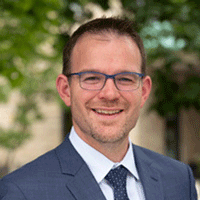The kickoff conversation will be held both in person and via livestream on Oct. 13
by Princeton Theological Seminary | Special to Presbyterian News Service

Photo by Fred Moon via Unsplash
PRINCETON, New Jersey — In a moment defined by cascading crises, many people across the nation are wondering about the future of American democracy. In the months ahead, Princeton Theological Seminary will confront this uncertainty head-on, convening a series of conversations with leaders poised to shape the future.

Dr. Heath W. Carter
The kickoff conversation — on the challenge of hyper-polarization and how this phenomenon affects Christian communities, our ability to sustain government of and by the people, and the course of everyday life — takes place from 4:30 p.m. through 6 p.m. Eastern Time on Thursday, Oct. 13, on the Atrium of the Wright Library, 64 Mercer Street in Princeton, New Jersey. The free event will also be livestreamed. Registration is required; go here to register.

Jane Coaston
Panelists will be moderated by Dr. Heath W. Carter, associate professor of American Christianity at Princeton Seminary. Panelists are:
- Jane Coaston, a columnist for The New York Times and the host of The Argument.
- U.S. Rep. Peter Meijer, R-Michigan.
- Symone D. Sanders-Townsend, the former spokesperson for Vice President Kamala Harris and an MSNBC host.

U.S. Rep. Peter Meijer
The multi-part Future of American Democracy initiative will examine current conversations around the hope of democracy and the effects on people’s lives today. The series is funded by the Princeton Theological Seminary Board of Trustees’ New Faculty Initiatives grant, for which a major goal is to create new pathways to public engagement.

Symone D. Sanders-Townsend
For more information, contact Thais Carter, director of strategic initiatives, at democracy.panels@ptsem.edu or 609-688-1945.
About Princeton Theological Seminary
Founded in 1812, Princeton Theological Seminary was the first seminary established by the General Assembly of the Presbyterian Church. Its mission is to educate leaders for the church of Jesus Christ worldwide.
Its students and more than 11,000 graduates from all 50 states and many nations around the world serve Christ in churches, schools and universities, health care institutions, nonprofit agencies, initiatives for social justice and the emerging ministries of the church in the 21st century. More information can be found here.
![]() You may freely reuse and distribute this article in its entirety for non-commercial purposes in any medium. Please include author attribution, photography credits, and a link to the original article. This work is licensed under a Creative Commons Attribution-NonCommercial-NoDeratives 4.0 International License.
You may freely reuse and distribute this article in its entirety for non-commercial purposes in any medium. Please include author attribution, photography credits, and a link to the original article. This work is licensed under a Creative Commons Attribution-NonCommercial-NoDeratives 4.0 International License.